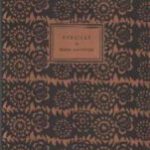From of old the scheme of all that must be has existed.
The pen of destiny has written good and evil without ceasing.
He has appointed in predestination all that must come.
We distress and bestir ourselves, but all to no avail.
Archieven
Rosen, F.
Before now there have been signs of what is to come,
The pen never rests from good or evil.
Destiny has given you all that is to be,
Our worries and our endeavours are in vain.
Rodwell, E.H.
The tablet bears a secret impress writ;
Of good or bad, the pen recks not one whit;
Whatever under Fate seemed right was giy’n;
‘Tis vain to struggle and to fight with it.
Tirtha, Swámí Govinda
His tablet bears the future but concealed,
His pen is calm if good or bad we yield.
The powers gave us proper share at first,
With grief or strife no less nor more we wield.
Saidi, A.
On Tablet writ whatever was to be,
And good or bad the Pen wrote the Decree;
On Day of Qismet all the lots were cast –
Our grief and struggle are but vanity.
Thompson, E.F.
O, Heart! Since earth’s truth is illusion vain,
Why so distressed in lasting grief and pain?
Bear trouble ! Bow to Fate ! Once gone the Pen
For thee will never trace the scroll again!
Roe, G.
Ere yet the dawn of Azal shed its light
O’er dreary chaos and the realms of night,
The Pen, unmoved by good and evil, wrote;
Nor grief can change, nor endless toil rewrite.
McCarthy, J.H.
O heart, my heart, since the very basis of all this world’s gear is but a fable, why do you adventure in such an infinite abyss of sorrows? Trust thyself to fate, uphold the evil, for what the pencil has traced will not be effaced for you.
Garner, J.L.
Whatever is, by Fate was erst designed,
The Maker now his Labor has resigned,
And all our Striving can avail us Naught,
For all our Acts were long ago defined.
Rubáiyát of Omar Khayyám of Naishápúr
Rubáiyát of Omar Khayyám of Naishápúr. – [S.l. : s.n.], 1923. – [34 p.], 26 cm.
Printed by Joh. Enschedé en Zonen, Haarlem.
“The second Munich Print. The Rubáiyát of Omar Khayyám translated by E. FitzGerald according to the 4th edition has been printed in two hundred numbered copies in the Fleischman Antiqua by Joh. Enschedé en Zonen in Haarlem in the summer 1923 for the Verlag der Münchner Drucke in Munich. The numbers one to ten were handbound in coloured parchment. This is copy number: …”.
